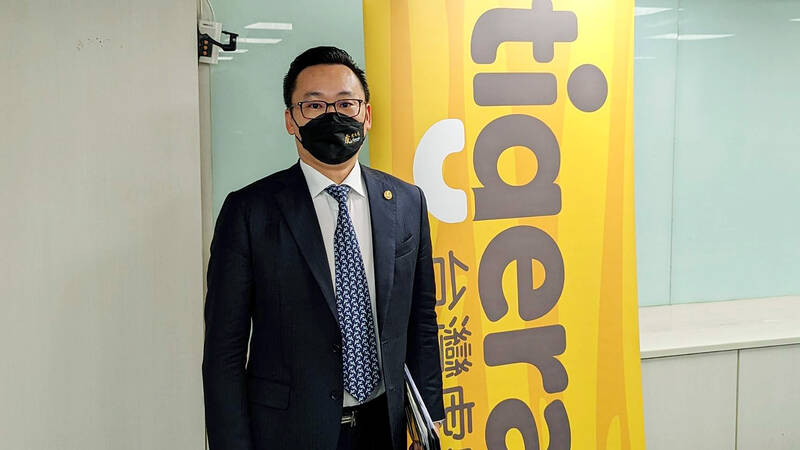Flights to Japan were canceled due to a labor shortage at Japanese airports, but services would increase in January, Tigerair Taiwan Ltd (台灣虎航) chairman Kevin Chen (陳漢銘) told a news conference in Taipei yesterday.
The remarks by the low-cost carrier came after customers complained that flights had been canceled abruptly despite a large promotional campaign last month to mark the easing of border restrictions in Taiwan and Japan, with many cheap tickets offered.
“Japan has reopened its borders, but it does not have enough workers carrying out testing and other services, so Taiwanese airlines have been forced to reduce flights to Japan,” he said.

Photo: Cheng Wei-chi, Taipei Times
Chen said that he had just returned from a three-day business trip in Japan, during which he visited Japanese government officials and airport representatives to determine ways to ease the impact on Tigerair flights.
“In the past, staff at New Chitose Airport [Sapporo airport] could handle passenger arrivals from different flights, but now it has a limited workforce that can only serve arrivals from one flight at a time.” Chen said. “The human resource situation at Japan’s airports has changed a lot.”
Despite the personnel limitations, Japan still maintains a high bar in terms of baggage and immigration checks, and testing services for COVID-19, he said.
Most airports are focused on domestic flights, as the Japanese government is encouraging domestic consumption, leaving fewer employers for international flights, he said.
Government officials from tier 2 and tier 3 cities in Japan have expressed an interest in receiving international flights to boost local tourism, but the labor shortage might limit such plans in the near term, he said.
Tigerair and the Japanese government are discussing whether the airline should send employees to support some services at Japanese airports, such as ticket handling or shuttle services to maintain smooth operations there, Chen said.
“About 30 Tigerair employees working at Taiwan Taoyuan International Airport are willing to support the airports in Japan, such as those in Tokyo, Osaka and Okinawa, in addition to the New Chitose Airport,” he said.
However, some services, such as quarantine and security, must be carried out by Japanese customs officials or other airport staff there, he added.
At a meeting with officials from the Japanese Ministry of Land, Infrastructure, Transport and Tourism, Tigerair expressed concern that if flights are canceled during the Lunar New Year holiday next year, it would be highly inconvenient for its customers, Chen said, adding that the officials said they would work on the issue and asked for the flight schedules of Taiwanese airlines.
Tigerair plans to boost the number of its flights to Sapporo and Tokyo from January, as it is possible that the workforce issues at some airports would be improved by then, he said.
The company would also allow people whose flights were canceled to change their schedules for free, he added.

Taiwan Semiconductor Manufacturing Co (TSMC, 台積電) last week recorded an increase in the number of shareholders to the highest in almost eight months, despite its share price falling 3.38 percent from the previous week, Taiwan Stock Exchange data released on Saturday showed. As of Friday, TSMC had 1.88 million shareholders, the most since the week of April 25 and an increase of 31,870 from the previous week, the data showed. The number of shareholders jumped despite a drop of NT$50 (US$1.59), or 3.38 percent, in TSMC’s share price from a week earlier to NT$1,430, as investors took profits from their earlier gains

In a high-security Shenzhen laboratory, Chinese scientists have built what Washington has spent years trying to prevent: a prototype of a machine capable of producing the cutting-edge semiconductor chips that power artificial intelligence (AI), smartphones and weapons central to Western military dominance, Reuters has learned. Completed early this year and undergoing testing, the prototype fills nearly an entire factory floor. It was built by a team of former engineers from Dutch semiconductor giant ASML who reverse-engineered the company’s extreme ultraviolet lithography (EUV) machines, according to two people with knowledge of the project. EUV machines sit at the heart of a technological Cold

Taiwan’s long-term economic competitiveness will hinge not only on national champions like Taiwan Semiconductor Manufacturing Co. (TSMC, 台積電) but also on the widespread adoption of artificial intelligence (AI) and other emerging technologies, a US-based scholar has said. At a lecture in Taipei on Tuesday, Jeffrey Ding, assistant professor of political science at the George Washington University and author of "Technology and the Rise of Great Powers," argued that historical experience shows that general-purpose technologies (GPTs) — such as electricity, computers and now AI — shape long-term economic advantages through their diffusion across the broader economy. "What really matters is not who pioneers

TAIWAN VALUE CHAIN: Foxtron is to fully own Luxgen following the transaction and it plans to launch a new electric model, the Foxtron Bria, in Taiwan next year Yulon Motor Co (裕隆汽車) yesterday said that its board of directors approved the disposal of its electric vehicle (EV) unit, Luxgen Motor Co (納智捷汽車), to Foxtron Vehicle Technologies Co (鴻華先進) for NT$787.6 million (US$24.98 million). Foxtron, a half-half joint venture between Yulon affiliate Hua-Chuang Automobile Information Technical Center Co (華創車電) and Hon Hai Precision Industry Co (鴻海精密), expects to wrap up the deal in the first quarter of next year. Foxtron would fully own Luxgen following the transaction, including five car distributing companies, outlets and all employees. The deal is subject to the approval of the Fair Trade Commission, Foxtron said. “Foxtron will be